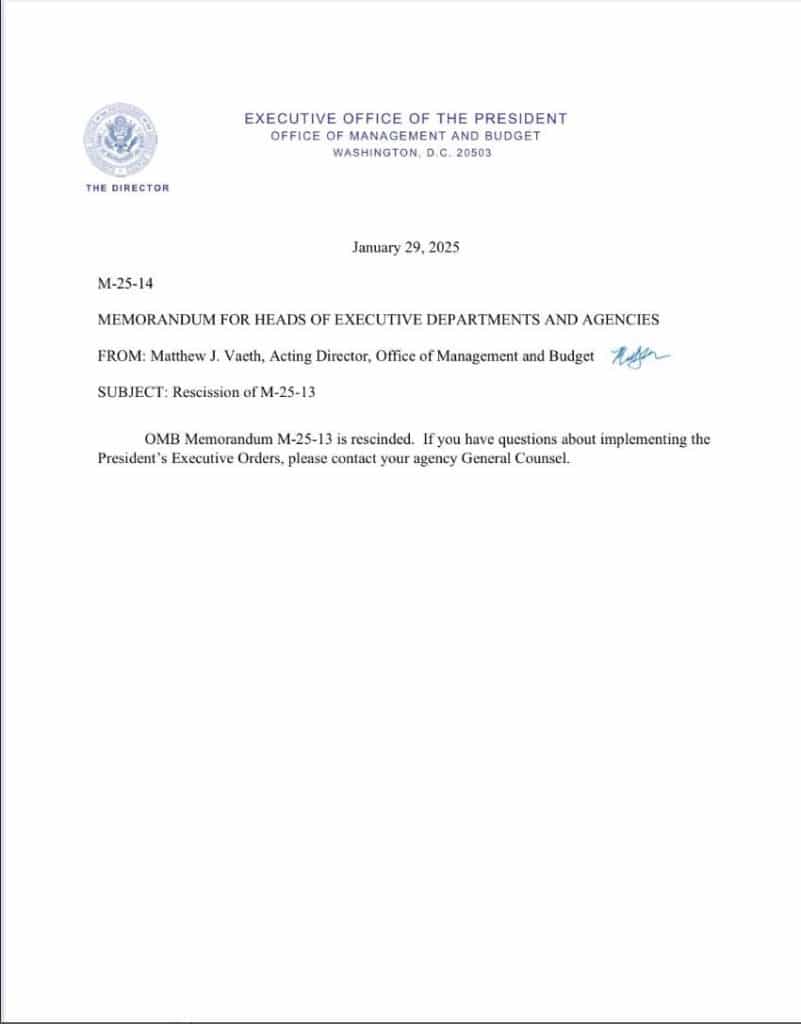Overview:
The Trump administration has ordered a federal funding freeze on grants and loans to review alignment with the president's policies.
In a one-sentence memo, the Trump administration has rescinded the federal assistance spending freeze on January 29, 2025- nearly 24 hours from the previous guidance.

A memo from the White House Office of Management and Budget (OMB) is calling for a freeze on federal assistance spending by 5 p.m. Tuesday, a move that could impact aid to nonprofits, universities, small business loans, and state and local government grants.
The potential freeze could have far-reaching consequences, with the White House noting that $3 trillion was allocated to federal assistance programs in 2024.
“This memorandum requires Federal agencies to identify and review all Federal financial assistance programs and supporting activities consistent with the President’s policies and requirements,” the memo states.
The White House has not commented on the memo, which leaked Monday night.
The directive explicitly instructs federal agencies to assess compliance with President Trump’s executive orders, targeting what it calls “DEI, woke gender ideology, and the Green New Deal.”
However, the memo does not specify these terms, particularly since the Green New Deal was never enacted into law.
“The use of Federal resources to advance Marxist equity, transgenderism, and Green New Deal social engineering policies is a waste of taxpayer dollars that does not improve the day-to-day lives of those we serve,” the memo reads.
The White House memo clarifies that the freeze will not impact Medicare or Social Security benefits.
Democrats were quick to criticize the move. On Tuesday morning, Senate Minority Leader Chuck Schumer called the spending freeze chaos. “It will mean missed payrolls and rent payments and everything in between: chaos for everything from universities to non-profit charities, state disaster assistance, local law enforcement, aid to the elderly, and food for those in need.”
Schumer further warned that the freeze could affect disaster relief, aid to the elderly, and school lunch programs and that Congress approved these investments, and “they are not optional; they are the law.”
Diane Yentel, president and CEO of the National Council of Nonprofits, expressed alarm on social media.
“This order is a potential 5-alarm fire for nonprofits and the people and communities they serve. From pausing research on cures for childhood cancer to closing homeless shelters, halting food assistance, reducing safety from domestic violence, and shutting down suicide hotlines, the impact of even a short pause in funding could be devastating and cost lives, Yentel said on X, formerly known as Twitter. “This order could decimate thousands of organizations and leave neighbors without the services they need.”
The memo is expected to face swift legal challenges from affected entities. Lower courts could issue orders to resume funding while proceedings are underway, potentially pushing the Justice Department to seek emergency relief from the Supreme Court.
Critics argue that the budget office’s freeze violates the Impoundment Control Act, a 1974 law that limits the president’s authority to withhold funds appropriated by Congress.
However, Russ Vought, President Trump’s nominee to lead the OMB, defended the move during his Senate confirmation hearing last week, claiming the Impoundment Control Act is unconstitutional. “The president believes the law infringes on executive authority, and I share that view,” Vought said.
The freeze has already sparked heated debate, with political and legal battles likely to follow in the coming weeks.





